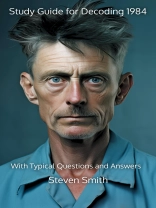’Decoding 1984′ is designed to navigate you through the oppressive world of Airstrip One, shedding light on the intricate layers that make Orwell’s vision both compelling and cautionary. This guide aims to enhance the readers’ understanding and appreciation of one of the 20th century’s most significant literary works. The guide dives into the historical and political context that influenced Orwell’s writing. The rise of totalitarian regimes during Orwell’s lifetime served as a direct inspiration for '1984′, offering a grim prophecy of a world where personal freedom succumbs to all-encompassing state control.
’Decoding 1984′ breaks down the narrative chapter by chapter, providing summaries that capture the essence of the plot while highlighting key details and developments. This structured overview ensures that readers can grasp the progression of the story and the escalating tension as Winston Smith, the novel’s protagonist, navigates the dangers of dissent in a society under constant surveillance.A critical component of our guide is the detailed analysis of characters. From Winston’s quiet rebellion to Julia’s pragmatic resistance and the omnipresent threat of Big Brother, we delve into their motivations, inner conflicts, and roles in illustrating the novel’s themes. Speaking of themes, this guide does not shy away from exploring the novel’s exploration of totalitarianism, the distortion of truth, the power of language, and the pervasive nature of surveillance. Each theme is carefully dissected to understand Orwell’s critique of power and control. Moreover, the study guide examines Orwell’s literary devices and the structural decisions that amplify the impact of '1984′. From the use of irony to the stark, foreboding tone of the narrative, we look at how Orwell crafts a fantastical and eerily plausible world. Finally, the guide includes a discussion of the climax and resolution, the moral of the novel, and a reference to memorable lines from the novel.
This study guide for '1984′ by George Orwell is more than just an academic tool; it’s an invitation to reflect on the themes of power, freedom, and resistance that resonate just as strongly in today’s world as they did when Orwell first penned his iconic novel.












